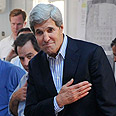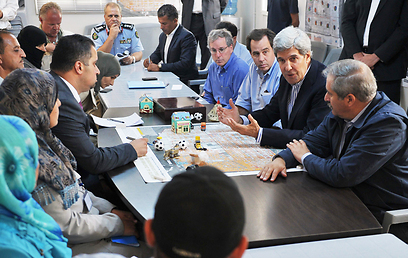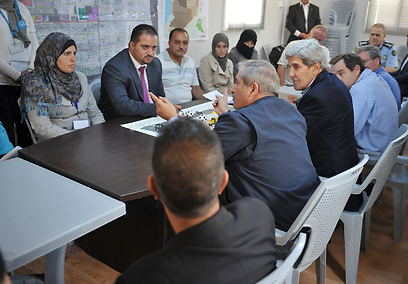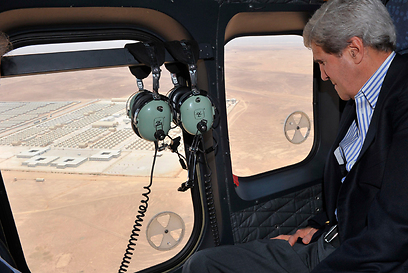
Syrian refugees demand help from Kerry at Jordan camp
US secretary of state visits refugee camp in northern Jordan, meets with Syrians who fled homeland, hears criticism of US policy. ‘Where is international community?’ one woman asks
The Syrians, who met with Kerry at the Zaatari refugee camp in northern Jordan, expressed anger at American policy. "Please, declare a restricted flight zone to prevent Assad's planes from bombing," requested one of the five women and man who met with the American emissary. Another woman asked, "Where is the international community? Why are you waiting? At least enforce the embargo.”
Related stories:
"You and the US government look to Israel with respect," said one woman. "Can't you do the same with the children of Syria?"
The Syrian refugees asked Kerry to create buffer zones to stop the transfer of weapons and aid from Iran to Syrian President Bashar Assad. They also requested of Kerry that the US stop Lebanese Hezbollah forces from entering into Syria and fighting together with Assad's forces against the rebels. The secretary of state replied that he was not satisfied with the situation in which Hezbollah and Iran were intervening in the civil war.

Kerry meets refugees in Jordan (Photo: AP)
"We are trying to help in various ways, including helping Syrian opposition fighters have weapons. We are doing new things. There is consideration of buffer zones and other things, but it is not as simple as it sounds," Kerry replied.
"You are not abandoned," he said. "We are very aware of how terrible conditions are inside Syria. I came here today because we are concerned. I promise you I will take your voices and concerns back with me to Washington as we continue to work with our friends in ways that can be helpful."

Kerry meets Syrian refugees (Photo: AFP)
After the meeting, Kerry told reporters he understood the refugees' concerns but stressed that the US is the largest provider of humanitarian aid to the Syrian people, both inside the country and in camps.
Washington has provided nearly $815 million in humanitarian assistance to Syrians through the United Nations, $147 million of which has been directed to relief agencies working in Jordan.
Killian Kleinschmidt, the camp manager for the UN High Commissioner for Refugees, said the refugees' stories are getting worse. "The conflict has reached a level of brutality that is unbelievable," he told Kerry in a briefing before the secretary met the refugees.
Kleinschmidt said every family can tell stories of rape, torture, arrest and disappearances. Children draw "horrible pictures of destruction," he said.

Kerry views refugee camp from above (Photo: Reuters)
The camp houses about 115,000 people, making it the fourth largest city in Jordan, which is now home to more than 600,000 Syrian refugees. Turkey and Lebanon are also hosting hundreds of thousands of refugees. The United Nations has called it the worst humanitarian crisis in decades.
The Zaatari camp was set up last July. At the high point in April, an average of 1,500 people arrived each day. The current population is down from a high of nearly 130,000 because some people are leaving – some to go back to join the fight, some to tend to properties in areas that are relatively safe and some into Jordan if they can prove they have relatives already there.
But people are still arriving, although in much smaller numbers than before; most Syrians who lived closest to the border are already in Jordan and the new arrivals are coming from farther away, Kleinschmidt said, One hundred arrivals Wednesday night had spent 17 days on the road coming from the Homs area, about 200 miles away. The start of Ramadan may also play a role in the reduced influx of refugees.
AP contributed to this report
- Receive Ynetnews updates directly to your desktop










